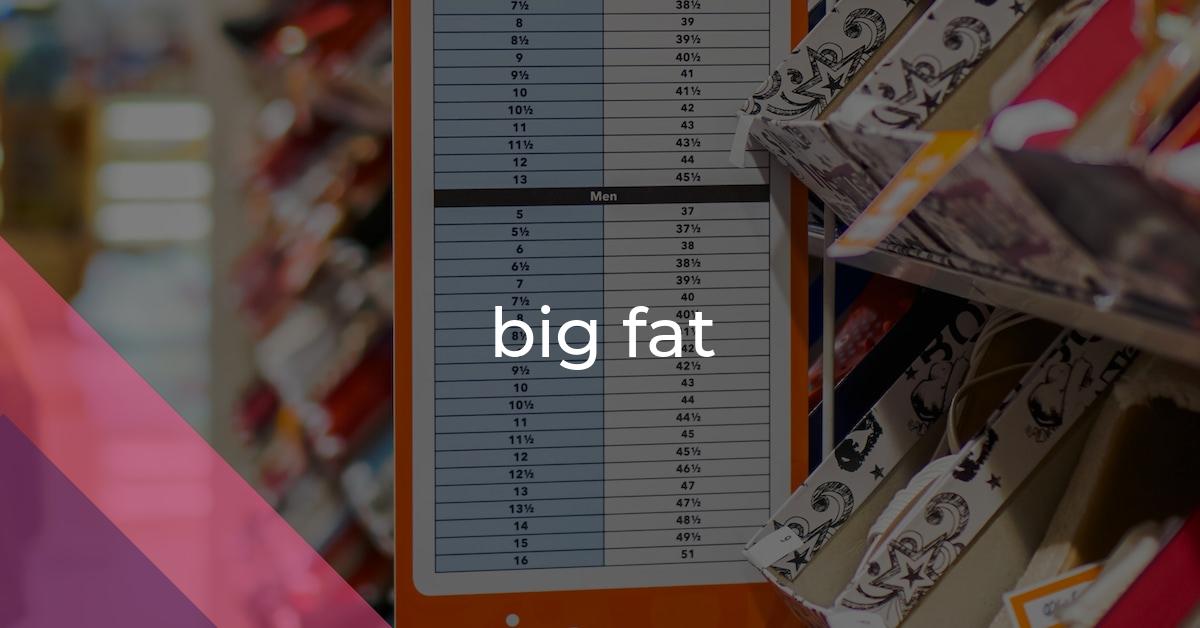big fat: Idiom Meaning and Origin
What does ‘big fat’ mean?
An idiom that is used to emphasize the size or degree of something, often in a negative or critical context.

Idiom Explorer
The idiom "in the least" is used to emphasize that something is not at all or in any way. It is often used to express a strong negative sentiment or to emphasize a lack of expectation or possibility.
The idiom "in no small part" indicates that something or someone contributes significantly to a particular outcome or situation, usually emphasizing the size or importance of their contribution.
The idiom "in no small measure" means to a great extent or to a significant degree. It emphasizes the idea that something has a substantial or considerable impact or influence.
An idiom that means an extremely small or tight space, often used to convey a sense of constriction or being cramped.
The idiom "in a big way" means to do something on a large scale, with great intensity or significance.
An idiom meaning someone has an extremely unattractive or unpleasant face, often used to give a brutally honest description of someone's appearance.
The idiom "great deal" means a large amount or quantity of something. It is used to indicate that there is a significant or considerable extent or degree of something.
An idiom used to describe someone leaving or departing. It implies a physical or metaphorical departure from a place or situation.
An idiom used to express frustration, shock, or annoyance, often in an exasperated or pleading tone.
Unraveling the Enigma
The idiomatic expression "big old" is related to the idiom "big fat" in that both phrases serve to intensify and emphasize a particular quality or characteristic. While "big fat" is typically used in a negative or critical manner, "big old" is often employed in a more positive or affectionate context.
The term "big old" is comprised of the words "big" and "old", each carrying their own denotations that contribute to the overall meaning of the idiom. "Big" conveys a sense of size or magnitude, while "old" refers to something that has been in existence for a long time.
When used together, "big old" functions as a means of emphasizing the grandeur or significance of something. For example, one might say "I found a big old book" to highlight the impressive size or age of the book. In this context, the idiom conveys a sense of admiration or awe.
Similarly, the phrase "big old" can also be used to intensify positive qualities or characteristics in a lighthearted or playful manner. For instance, someone might say "He's a big old goofball" to playfully emphasize someone's entertaining or silly nature. This usage adds a friendly and affectionate tone to the description.
On the other hand, the idiom "big deal" is related to "big fat" in that both phrases are used to express a lack of importance or significance. However, unlike "big fat" which is often used in a critical manner, "big deal" can be employed in both positive and negative contexts.
The idiom "big deal" is composed of the words "big" and "deal", with "big" signifying size or magnitude and "deal" referring to an event or occurrence. When combined, the idiom suggests that something is not as important or significant as it may seem.
In a negative context, "big deal" can be used to express a sense of dismissal or indifference towards an event or situation. For example, someone might say "So what? It's not a big deal" to downplay the significance of something that others may view as important. This usage conveys a sense of apathy or lack of interest.
Conversely, "big deal" can also be used sarcastically or ironically in a positive context to highlight the significance of something that others may view as unimportant. For instance, someone might say "Oh, you won first place in a race? Big deal!" to tease or playfully acknowledge the accomplishment. This usage adds a touch of humor or levity to the statement.
The idioms "big old" and "big deal" are related to the idiom "big fat" in that they all serve to intensify or emphasize certain qualities or characteristics. While "big fat" is typically used in a negative or critical manner, "big old" can have a more positive and affectionate connotation, and "big deal" can be employed in both positive and negative contexts. These idiomatic expressions contribute to the richness and versatility of the English language, allowing for nuanced and expressive communication.
Example usage
Examples:
- She received a big fat check for winning the lottery.
- He has a big fat smile on his face after getting promoted.
- We had a big fat turkey for Thanksgiving dinner.
Analysis:
The idiom "big fat" is often used to emphasize the size or abundance of something. In the examples provided, it is used to describe the following:
- A large and substantial amount of money received as a check.
- A wide and beaming smile that clearly showcases happiness and pride.
- A plump and well-fed turkey served as the main dish for a Thanksgiving meal.
More "Adjective" idioms



